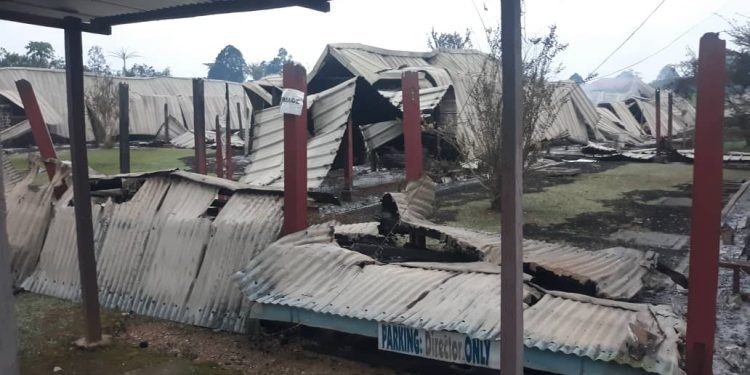Partial view of burnt down Mamfe District Hospital. Reports blamed it on separatists fighters
By Sendy Forlemu
In Cameroon’s Northwest and Southwest Regions, healthcare workers are trapped in a perilous predicament, navigating the treacherous waters of armed conflict while striving to fulfil their sacred medical duties. As violence escalates, the fundamental right to health care hangs in the balance, placing both medical personnel and the communities they serve in grave danger.
In December 2020, MSF activities were suspended by State authorities in the Northwest region and some Health facilities have been burnt, one of the most glaring cases is the Mamfe District Hospital, burnt in June 2022, by Separatist fighters because they believed that the State Military were treated there. Doctors Without Borders (MSF) issued a communique, condemning the attack on the Mamfe district hospital stating that; “This unprecedented attack on a hospital of vital importance will have a major impact on people in a region where access to healthcare has already been gravely impacted by years of violence,” said Sylvain Groulx, MSF’s operational manager for Central Africa. “As we wait for further information on the attack and its consequences for hospitalised patients, MSF strongly condemns this aggression, which will increase the suffering of people. We say again: medical care must not be a target.”
The closure of Doctors Without Borders (MSF) project bases in Kumba (2021) and Mamfe (2022) marked a significant turning point for healthcare in the Southwest region of Cameroon. The termination of contracts for the majority of MSF staff left many without financial support and exacerbated the already dire healthcare situation.
Community pharmacists faced harassment and violence from both state forces and separatist fighters, each accusing them of aiding their enemy. This environment of mistrust has made it increasingly difficult for healthcare providers to operate safely.
According to the UN Office for the Coordination of Humanitarian Affairs (OCHA, a total of 86 humanitarian organisations reported implementing activities in the Northwest and Southwest regions. This included 66 national NGOs, 10 UN agencies, 9 international NGOs, and 1 organisation from the Red Cross and Red Crescent (RCRC) movement. OCHA added that; over 630,000 people are internally displaced, more than 86,000 people have taken refuge in neighbouring Nigeria, as a result of the violence in the North West and South West regions of Cameroon and more than 210 health facilities are no longer functional because of destruction or abandonment by health personnel.
A community health service provider from an SRHR organisation, who requested anonymity, recently shared her harrowing experience while conducting a health campaign in the Northwest. “Curfews and roadblocks make it almost impossible to reach those in need,” she lamented. Despite these challenges, her team pressed on with their mission to raise awareness about HIV and provide essential health services.
The journey was fraught with peril. At one police checkpoint, officers rifled through their supplies, destroying condoms and confiscating others. “It was unsettling,” she recounted. “But nothing prepared us for what happened next.” At a separatist checkpoint, the team was met with armed men who pointed guns at them in a terrifying display of power. “When one of my colleagues collapsed, I feared for our lives,” she recalled, her voice shaking with the memory. “We were terrified, but ultimately, they begged some of the condoms we were carrying and let us through.”
Despite the chaos, the team persevered, conducting door-to-door outreach amid heavy gunfire. Their scheduled three-day campaign was hampered by violence and a lockdown that trapped them in the village for a week. “We had to pay off military checkpoints just to leave,” she said. “Those without money were beaten.”
This ongoing conflict not only disrupts healthcare but also jeopardises education for children and exacerbates poverty within communities. The fundamental right to access medical care remains under siege as insecurity rises. Healthcare workers are forced to navigate a treacherous landscape where their commitment to neutrality and impartiality is constantly tested.
Humanitarian operations during conflict must adhere to essential operational principles: neutrality, impartiality, and independence. These principles are vital for ensuring that aid reaches those who need it most, regardless of their affiliations. Yet, in a climate where suspicion reigns and armed factions vie for control, these principles are increasingly difficult to uphold.
As the conflict in Cameroon continues to escalate, the plight of healthcare workers becomes ever more urgent. It is imperative that all parties involved in the conflict respect the rights of the sick and wounded, allowing access to medical care without fear of retribution. It is incumbent on local authorities, international organisations, and humanitarian agencies to prioritise the safety of healthcare personnel and uphold their fundamental rights. The time warrants a unified effort to ensure that those who dedicate their lives to saving others can do so without fear of violence or persecution. The health of communities hangs in the balance—action is needed now more than ever.
